20th February 2024
The Spokesmen Cycling Podcast
EPISODE 346: Monica Garrison
SPONSOR: Tern Bicycles
HOST: Carlton Reid
GUEST: Monica Garrison of Black Girls Do Bike
20th February 2024
The Spokesmen Cycling Podcast
EPISODE 346: Monica Garrison
SPONSOR: Tern Bicycles
HOST: Carlton Reid
GUEST: Monica Garrison of Black Girls Do Bike
TOPICS:
LINKS:
TRANSCRIPT
Carlton Reid 0:13
Welcome to Episode 346 of the spokesmen cycling podcast. This show was engineered on Tuesday 20th of February 2024.
David Bernstein 0:29
The Spokesmen cycling roundtable podcast is brought to you by Tern bicycles. The good people at Tern are committed to building bikes that are useful enough to ride every day and dependable enough to carry the people you love. In other words, they make the kind of bikes that they want to ride. Tern has e-bikes for every type of rider. Whether you’re commuting, taking your kids to school or even carrying another adult, visit www.ternbicycles.com. That’s t e r n bicycles.com to learn more.
Carlton Reid 1:03
I’m Carlton Reid and today’s episode is a half hour chat with Monica Garrison of Black Girls Do Bike a Pennsylvania nonprofit now in its 11th year of group rides and more for black women and girls. And yeah, I should have checked out the weather map before I asked the first stupid question. Have you been riding today?
Monica Garrison 1:28
Oh, no! There’s snow everywhere. We had a big storm yesterday. Yeah, yesterday.
Carlton Reid 1:35
I should have checked your weather. Okay. So how much of the year can you not cycle in Pittsburgh?
Monica Garrison 1:43
Pretty much November to March is pretty snowy and rainy, and cold. So we have a nice big offseason here, though some folks ride through the winter. I’m not one of those people.
Carlton Reid 1:57
So you kind of come say March, April, you’re kind of really desperate to get out on your bike, that kind of thing.
Monica Garrison 2:05
Oh, yeah, the mid March The weather seems to shift and and cyclists return full force and and then we’re good. I mean, we get pretty hot in August and July, you know, it’s a bit unbearable and humid. So there’s some time there where it’s not so pleasant to be out on the bike, but pretty much yeah, the rest of the year we’re riding.
Carlton Reid 2:27
So I really should have checked the weather. Because that was such a stupid question, wasn’t it if you’re deep in snow, and of course. That’s okay. So the rest of the year. tell me about the rest of the year in Pittsburgh. What’s it like riding in Pittsburgh?
Monica Garrison 2:43
So Pittsburgh is notorious for its hills. It’s a very hilly city. So it’s not for the faint of heart. Literally. I think over the last 10 years, we’ve had a really good programme, Bike Pittsburgh is our local Bike Ped organisation. And they’ve done a really good job of creating infrastructure that connects. So there are large parts of the city that are interconnected for commuters and everyone else on bikes. So that’s nice. We have what we call the gap trail here, which is a Great Allegheny Passage. And it starts here in Pittsburgh, and you can ride it all the way to Washington, DC. So a lot of local cyclists put that on their list of things to do in the spring and summer, before it gets too hot. And our we have Port Authority, which is our local bus transportation here. And they made an effort a few years ago to outfit all of the buses with bike racks on the front. So no matter where you’re headed, you can take your bike with you
Carlton Reid 3:52
Now, we’re very jealous. When when we see Americans with, with buses with that on the front, we get very jealous, we’ve got very few services that will will do that. So I’ve seen photographs on your, on your website, where it’s like the media images where you can get these the photographs you’re allowed to use. And there’s you and your kids, and there’s a bike lane in Pittsburgh. So I can visualise extremely well, the bike lane that you were talking about there, but your kids. So not only are you getting women of colour, and you’re getting people just generally onto bikes. You’re we’ll talk about your chapters in a minute, but you’re getting your kids onto bikes. That’s something that you wanted to do. That’s something that just happened what so how have you managed to get your kids on bikes?
Monica Garrison 4:46
I mean, when I was a kid, I loved riding my bike, so I just assumed that they would too. And I you know happened to me correct. But what I did was honestly I started them riding really early like my son and daughter for probably pedaling bikes at the age of four. And so the earlier you get them in, The more consistent you are with them wearing helmets, then it just becomes a part of their life. And so you know, when, when Black Girls Do Bike started, it was a time where I was riding my bike a lot more than I had in the past. And so I just invited them to come along, and they they kind of got bitten by the bug. I will say my, my daughter, my son is probably the one who goes with me the most these days, we’ll load up the bikes and drive to like our downtown area and spend a couple hours riding around when the weather’s nice. And that’s really fun to do. So yeah, it’s just a no, no, it’s, it’s a fun thing to do as a family. Cycling is great for me as a solo sport. But I also like bringing folks along and you know, showing them how fun it can be.
Carlton Reid 5:55
So you have all these chapters across I mean, this one is the one that’s in London, is that still going?
Monica Garrison 6:01
it’s still going but we have, we have a leadership vacuum, there we are our leaders who started the group stepped down to do another project. So we’re actually looking for someone to kind of step in and, you know, rejuvenate the chapter.
Carlton Reid 6:17
Tell me about the chapters in in the US than them and how big did they get? Which are the biggest ones? What’s the chapter story?
Monica Garrison 6:25
Sure, we have 103 chapters here in the US. So as you can imagine, pretty much every major city here has a chapter every almost every state has has at least one chapter. The smallest chapters are, you know, a few 100 ladies and our largest chapters have anywhere from 1500 to 2000 members. I will honestly say that I we’ve never gotten 2000 out on a bike at once. But generally our rides are, you know, anywhere from five ladies to maybe 40 to 50 ladies.
Carlton Reid 7:04
Is it a kind of Facebook private group organised is that? Is that how you get in touch with everybody?
Monica Garrison 7:10
Yeah, I think Facebook’s been the easiest way. I mean, we’re 10 years into this journey. So Facebook was a lot more robust 10 years ago, but it’s still the best way to kind of organise people. And yeah, so each each chapter has its own Facebook, private Facebook group. And then so folks who are interested can go to BlackGirlsDoBike.org and then they can click on chapters, and then they can find the nearest chapter for them.
Carlton Reid 7:36
You’ve got very, very strong, bold graphics. Is that something that was there from the get go? Or is that something that evolved? Did you have members who are graphic artists? How have you managed to be really bold and distinctive?
Monica Garrison 7:53
That’s a good question. So it was always the intention from the beginning. Or I should say soon after, there’ll be an increase. So the plan really wasn’t to have chapters and have t shirts and jerseys and all this, these things all came organically as people began to ask for them. But, but once we started to design gear, I yeah, I think, you know, I was a business major. So I have a little bit of insight into, you know, what makes for good advertising. I’m also a photographer, so I’m visually built to, you know, built to appreciate things and design. I do most of the design myself, I usually just have an idea, and then I’ll collaborate with artists who can bring it to life. And I just, I There are a couple of reasons, I think, because as a Black woman, I know that, you know, our skin tone, generally looks really nice with bright colours, it’s kind of they complement each other. So I never shied away from bright colours and in, you know, variety in that respect, but also in terms of getting the message out, I think, you know, if someone’s wearing a shirt, and it’s visually appealing, and it catches the attention, then you’re more likely to spread your message and have people ask, what’s this about? You know, I’ve never seen this before. So I do think the the visual part of it is a huge part of our success.
Carlton Reid 9:20
And I kind of guessed why I kind of surmise that you’re a photographer because you’ve got your credit on some of the photographs. And there’s obviously a studio lights going on there. There’s some serious photography going on behind the scenes there. That’s like some pretty impressive stuff.
Monica Garrison 9:36
Thank you. Yeah, I think that’s been one of my favourite parts of this process is I’ve been able to flex my photography and video videography muscles a little bit. And, you know, in terms of like posting on our social media, that’s that’s it’s a nice way for me to be creative and not get too caught up in the day to day things.
Carlton Reid 10:01
So before that 2013 You’ve been going now this is your 11th 11th. Yeah, yeah. So So back, it was 2016 There was an article in bicycling it was by Elly Blue. Elly was the person who had the idea for bikenomics. So that’s me and Elly have spoken a lot over the years. So I know who Elly is. But there’s, there’s a quote in there, which I’d like to quote back to you. I mean, it is 2016. I’m not expecting you to remember this. But I just want you to riff on this really. And that is, so this is a quote and this is from you “know that my journey to riding may be completely different than yours. Know that my experience while riding, and even how I am perceived, while riding will be different to yours.” So Monica, clearly I cannot even start to imagine what it must be like for you as a Black woman on a bicycle because it bicyclists famously kind of like we’re out there sometimes when we’re not the most favourite people have lots and lots of what can I outcasts in many respects, even now. So you kind of take that, and then you take the fact that you’re a woman. And then you add on you’re Black. So you’re, you’re really stacking it against yourself here. So so kind of riff on what you said there about how the perception, your perception of you when you’re riding is going to be so so?
Monica Garrison 11:44
Yeah. Yeah, thanks for kind of breaking that down. It’s, so I do remember the quote, now that you read it, it’s, it comes back to me, I still believe it to be true. So you have a couple of things. So most women who are women of colour even plus size women, which is a category I fit into, we’re not expected to be cyclist, right. No one expects us to pull up on a bike. So you the first thing you overcome is the expectation of from the outside world, like, where did you come from? And what are you doing on the bicycle? And we could also have those internalised things just from our community. When folks say, Well, you know, why, why do you own a bike? Or how’d you get how’d you get into that? So there’s expectation. And you mentioned drivers on the road. That’s a big thing. For me, I prefer not to ride on the road, I try to ride on the trails as much as possible. But that’s just it’s a comfort level thing. And I think it varies from city to city and because all cities aren’t the same, but you know, as a woman cyclist you have, you might have men catcalling you, drawing attention to you physically when you’re on the bike from from a car, as a cyclist of colour. I know some cyclist, I can’t speak for all but some cyclists of colour feel less safe on their bikes. Because you know, the person behind the will, could have ill intentions for you. And, you know, an automobile always wins that contest, right? So if someone does want to do your do you harm or at least intimidate you, you know, you could be in a vulnerable, a more vulnerable position if someone doesn’t appreciate you being on the road as a cyclist, but then also has a problem with the colour of your skin. So I feel like I feel like most cyclists of colour feel that pressure as well.
Carlton Reid 13:46
Sorry, sorry. If you’re in a car and you experience racism, you’re in a car, you’ve got locked windows, you can you can kind of hide. But if you’re on a bicycle, you can’t hide, your skin is out there, you’re really like making sure that people know you’re there and that must be very vulnerable.
Monica Garrison 14:06
It does feel very vulnerable. It’s almost like you feel like a sitting duck, right? So if you put yourself in that position, I imagine you want to feel like you are equipped maybe to escape right? So physically, you may want to make sure that you have the strength, the stamina to get out of a tough situation. But yeah, when it comes down to it, as I said, the automobile is always going to win. So if someone does want to do you harm, not a whole lot you can do and that’s the scary part, as a cyclist and a cyclist of colour.
Carlton Reid 14:46
And then nothing all that I’m going to assume here that that’s one of the reasons why you would want to ride in a bunch of women, Black women together because you are not going to you want to get like there’s a group of you? You’re no longer alone?
Monica Garrison 15:03
Yeah, sure, safety in numbers. If you’re on the road, and they’re, you know, 10, 15 of you, then you’re drawing attention in the way of all the cars are going to see me. Right. So safety, but also there’s strength in numbers. So if something does happen, then you have folks there who are witnesses to report it. Hopefully, the the fact that there are multiple women, or people will deter someone from doing something, you know, negative. But yeah, certainly that I mean, there are many reasons why riding together is great and there are positives, but I think that’s definitely one of them.
Carlton Reid 15:40
At this point, we’ll cut from Monica to a short ad break. Take it away, David.
David Bernstein 15:46
This podcast is brought to you by Tern bicycles. The good people at Tern understand that while a large cargo bike can carry oodles of stuff, many of us prefer something a little more manageable. That’s why they’ve come up with the HSD e-cargobike for folks with big aspirations to go car free, delivered in a compact size, with its rear shock, 280 kilos, and a combined hauling capacity of 180 kilos. The robust new HSD is stable and easy to manoeuvre, even when under load. And with its Bosch eBIKE SYSTEM tested and certified to meet the highest UL standards for electric and fire safety you’ll be able to share many worryfree adventures with a loved one whether it’s your kiddo or Nan. Visit www.ternbicycles. That’s te r n turn bicycles.com to learn more
Carlton Reid 16:46
Thanks, David. And we are back with Monica Garrison of Black Girls Do Bike. So tell me about your Sheroes. Who are they?
Monica Garrison 16:56
Yes, Sheroes are women across the country who have volunteered their time to organise at least one monthly ride. They moderate the Facebook pages that we talked about earlier. And they keep you know, they keep it exciting. They also are plugged in, I’m plugged into the sheroes. So they let me know what folks are asking for or what things we need as an organisation or even get their opinions on, you know, designs, for instance, for cycling gear. But they’re just really enthusiastic women who who our boots on the ground, they’re doing the work that keeps the organisation moving forward. And they are really amazing. They’re like super fans of Black Girls Do Bike for the most part. And I’m very grateful to have them working on our side.
Carlton Reid 17:48
Now, how’s the industry been with you? Because famously, the industry is pretty white, is generally male. It’s kind of tech bro, but for bikes. So how has the industry? How does the industry perceive you? How is the industry maybe funded? You supported you? How have you done with the industry?
Monica Garrison 18:13
Sure. The I think in general, the statement would be that the industry has been very supportive. I was my first like introduction to the cycling community was the National Bike Conference in Washington DC many years ago. And I was really well received there. And then over the years, we’ve managed to have partnerships with probably Trek Bike was our first like manufacturer that would that partner with us for a couple of years. And they you know, they help support our national meet up one year and we all went to trek headquarters and participate in the Trek 100 we’ve been partners with REI, who’s a big outdoor supplier store here in the US. I don’t know if they’re overseas, but they’ve been a really nice strategic partner, not in terms of monetary support, absolutely. But also, you know, behind the scenes, finding out where our pain points are as an organisation and also connecting us with other orgs who are operating in the outdoors for minority groups. And, you know, for other activities like hiking and running and things like that. And then just along the way we we’ve had a number of other just companies who have stepped up from year to year to support us in different ways. But so yeah, overall, I think it’s been amazing. I’ve been in rooms that I never imagined I would be, you know, answering questions and helping with things like plus sizing for women in merchandise. You know, even even with designing bikes, I’ve given input with that. Notoriously women have Black women have issues getting cycling helmets that fit over their natural hairstyles. And I’ve been involved in, you know, some folks who want to change that. So I think overall, it’s been great. I’ve done lots of interviews through the years. And I think our message has, at least within the cycling community, I think our message has gotten out there. I think a lot of people are aware that we exist and know that we need support.
Carlton Reid 20:28
So imagine, you know, go back to 2013, when when this first kicked off, and now, have you seen any systemic changes? So you see, have you seen anything like, oh, wow, that’s so different to 10 years ago? Or is it this is going to be an uphill struggle? How do you how do you think it’s gone up? There’s 10 years? And how much of a difference maybe have you made?
Monica Garrison 20:52
Yeah, I think we’ve made really good strides. I think, when you when you show up to a bike event, now versus 10 years ago, there are a lot more women and people of colour at those events. I think I think obviously, we have a long way to go. But I definitely want to acknowledge the progress that we’ve made. And I hope that Black Girls Do Bike has been central and you know, letting people know of the concerns and issues that face our community, uniquely. But beyond that, I think, the most important thing, if you know, if we’re here, 10 years from now, still doing this work, is kind of the pain point has always been having people of colour in the decision decision making chairs, right, working at companies working in the industry, whether it be racing, whether it be you know, even other types of cycling, BMX, all of all the genres of cycling, I think we don’t have enough people of colour, who are working in those jobs, who can affect change from the inside. And as always, we’d love to see more bike shops that are owned by people of colour, which is a rare thing here in the US.
Carlton Reid 22:09
Monica, it’s gonna be a tough one to answer but but why is that? What Why? Why do you have to do what you do? Why Why isn’t it just normal for a black person to get out of bicycle? What’s what’s, what stopped black people from doing this?
Monica Garrison 22:27
That’s a good one, I think, well, I’ll speak for myself, but then I’ll go a little bit more broadly into it. So when I was a young person, I didn’t, there were no women in my family who rode bikes, I’ve never seen other than in my adult life, as a young person never saw my mom, you know, just casually get on a bike and ride it. So there’s that there is just not a norm in our community. Beyond that, I think you won’t really ride regularly, unless you have a bike that you enjoy riding that’s comfortable. And to get to that point, you have to spend some money, right to get a bicycle that is, you know, essentially fit to your body and, and is comfortable to ride. And so it could be just a matter of making the investment, there are a lot of sports that black people aren’t in because the barrier to entry be economic. And so here in the US, that’s, you know, the, there are a lot of black people below the poverty poverty line, who will never be able to enter some of these sports. And, and I think some people are just intimidated to walk into a room where they’re the only person that looks like them. Not everyone but but I think that is that can be a characteristic of people of colour, Black people. So you know, if you you may not want to show up to a ride, when you aren’t going to know anybody you anticipate it’s going to be all white guys who you may or may not have anything in common with, you don’t know how competitive the rides gonna be. So there are a lot of unknowns. And I think that alone is enough to keep you from trying something new. So that’s kind of where we come in, right? We we are pushing cycling as an activity that everyone can enjoy. But we’re also giving you a safe space, for lack of a better word, to to enter into it and to try it and see if you like it. You may try it and not like it never come back. But for some people, they show up they ride and they find that it’s you know, enjoyable and they and they continue to come and they discover something new. So we try to get that image intimidation factor out of the equation.
Carlton Reid 24:47
trying I’m trying to think if I have know the answer here, but in the Netherlands, where it’s a societal norm to ride a bike, Black people ride bikes. Asian people ride bikes, you know, Muslim women in their hijab ride bikes. It’s because it’s a cultural norm to ride a bike, because you were saying there before about, you know, you didn’t see your mom ride a bike. Well, in the Netherlands, all people will see their mom, their Auntie’s, their grandmother, the bank managers, everyone on bicycles. So there’s no real huge split in, in like a colour thing at all. It’s just it’s a cultural thing. And so, on the one hand, I’m asking you a question about being Black on a bicycle. But that question could be just as easily have asked of white people, generally, white people generally in the cultures, you know, in Britain, and in America and not in the Netherlands, but where we were out, it’s not a cultural norm to be on a bicycle. So that’s why people are on bicycles. And there is the colour aspect to it, of course, but it’s just generally, people aren’t on bikes. At the end of the day, and we are Monica, we are kind of weird.
Monica Garrison 26:03
No, you’re right, you’re right. It’s, it’s not a cultural norm to ride a bicycle in the United States, maybe with the exception of a few cities. I think, and I’ve heard this argument made, and I, for now, I agree with it until I hear a better one, which is, and I don’t know if this is true in the UK, as well. But here the infrastructure here is built around cars, right? So it’s car centric. So there is really a safety concern with being on a bicycle and on a lot of major roads in the US. And secondly, we value as a culture, individualism and we lead tie status to our car. So it’s the bicycle is secondary. The funny part is there was a time when bicycles were the main form of transportation here, right, and, and roadways were actually built a many of our fundamental roadways were built so that cyclists could get around and then at some point that that shifted, but I honestly don’t think we’ll ever move away from that maybe in 100 years, when, you know, cars are self driving, and it’s a lot more safe. And, you know, folks, their, their definition of success has changed. But for now, with a car centric society, I think cycling will always be a second class citizen,
Carlton Reid 27:29
just to end really, and that there’s a quote, another quote, I’m going to pick up from the Elly Blue article again, this is this is Monica by you. And I’d like you to riff on this a bit if you if you can. So, you said the cycling spectrum is a beautiful one. So what do you mean by the cycling spectrum?
Monica Garrison 27:46
I mean, the spectrum of personalities, and literally the types of people who ride bikes, I find as a as a general bunch, cyclists are extremely kind, gentle people. And, you know, anyone who appreciates the, you know, the value of getting on a bike and in finding that relaxing, I’m willing to be a friend to that person. But yeah, and even just a cycling in general, there are many types of cycling. So you can kind of there’s a phrase here you get in where you fit in. So once you decide that you like riding a bike, there’s so many things open to you in terms of the kind of cycling that you do, whether it’s long distance like cross country rides or cyclocross, gravel, BMX. You know, there’s so many things that you can get into.
Carlton Reid 28:40
Monica, it’s been an absolute pleasure to talk to you. Can you please tell people where they can? I’m definitely going to plug the fact that you’re looking for London people, but just where can people get more information? About Black Girls Do Bike, I’m kind of giving it away back is going to be a bit anyway, just give us the URL?
Monica Garrison 29:02
Sure. Blackgirlsdobike.org is the best way to find us. And from there you can link to as it’s pretty easy to navigate so you can link to our shops, check out our gear, you can link to our chapter page and see all the cities that we’re in.
Carlton Reid 29:18
Thanks for listening to Episode 346 of the spokesmen podcast brought to you in association with Tern Bicycles. Shownotes and more can be found at the-spokesmen.com The next episode will be a fireside chat on the Isle of Man with Richard Fletcher. That’s out at the weekend. But meanwhile, get out there and ride …
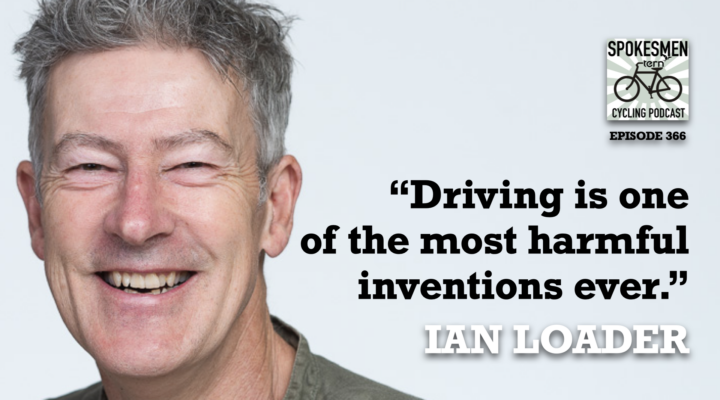
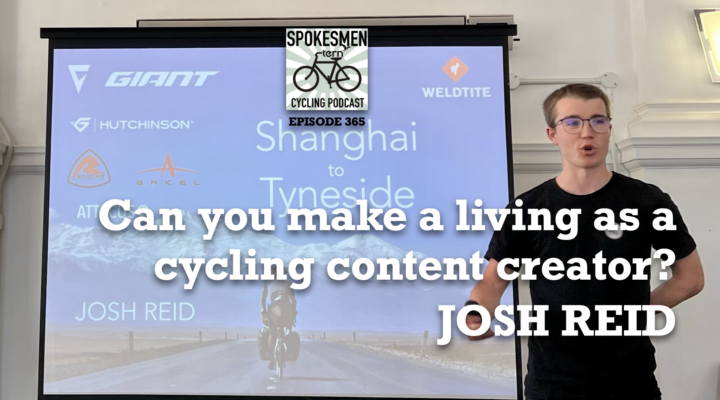
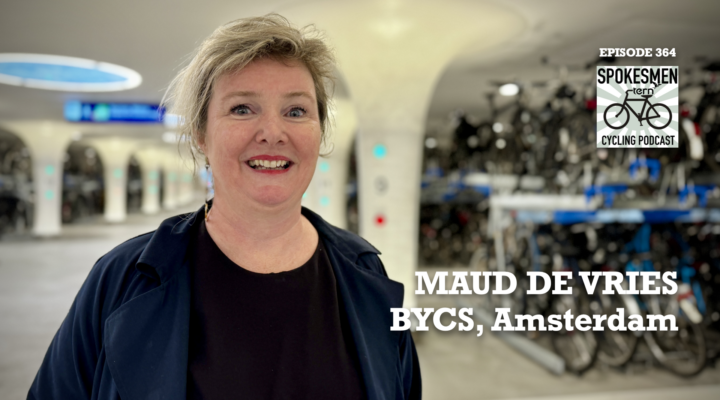
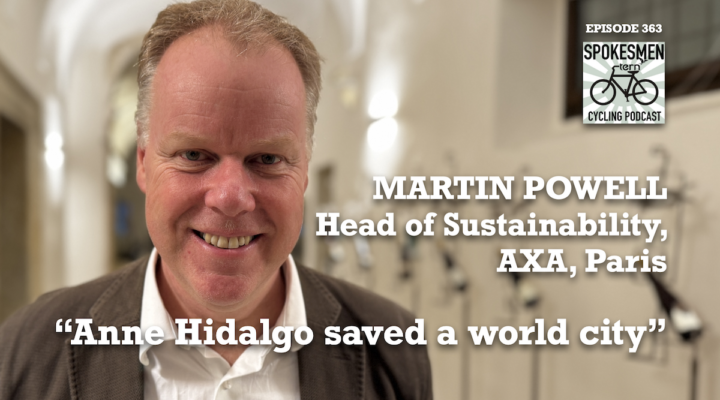
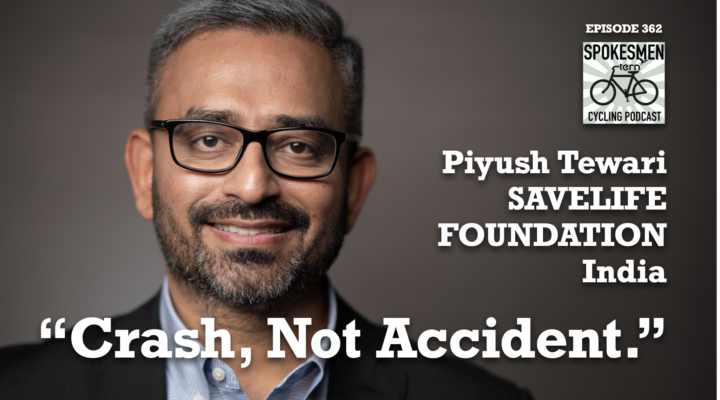
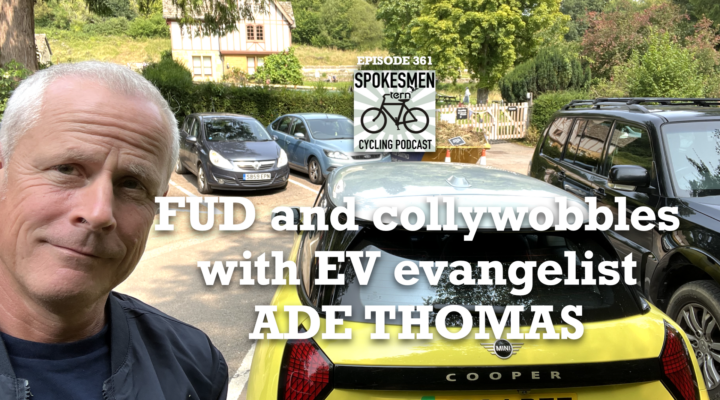
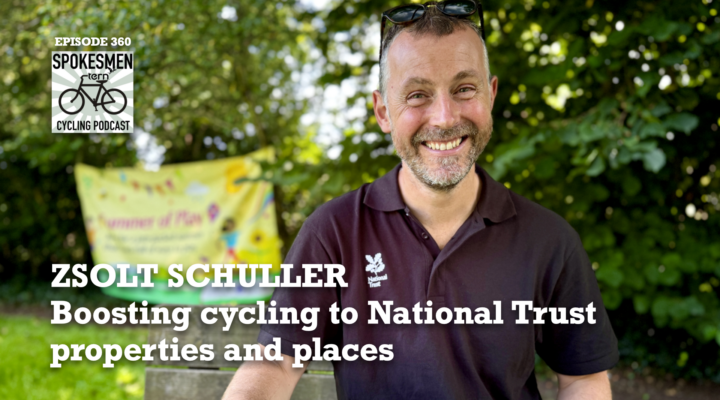
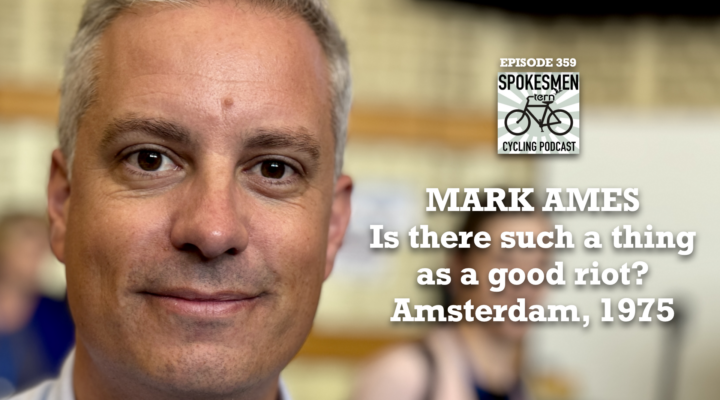
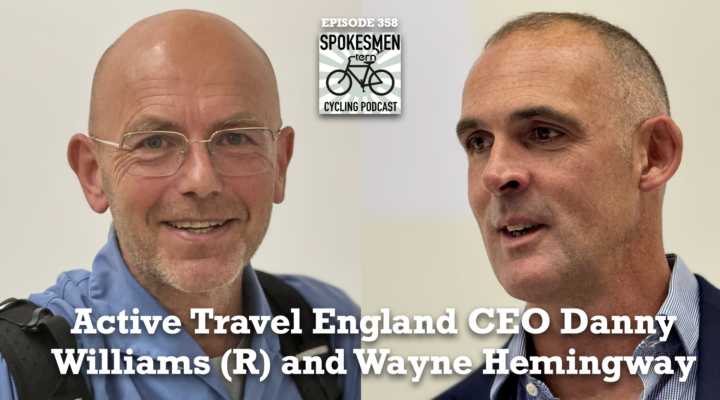
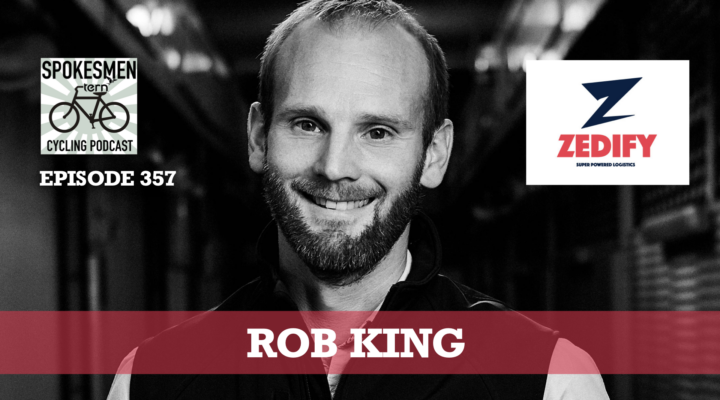
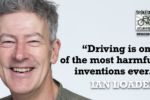
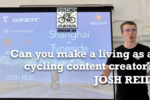

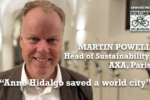
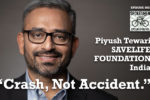


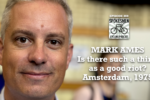


Be First to Comment